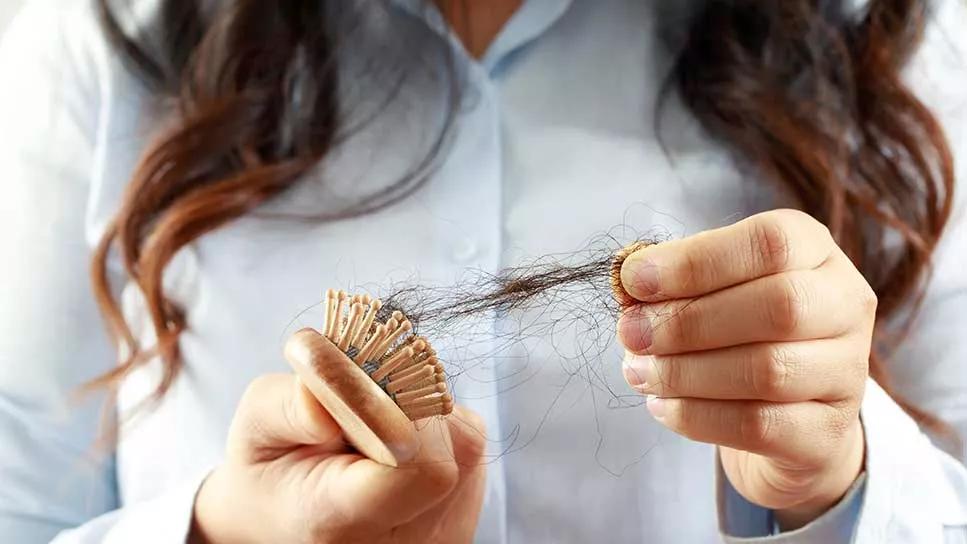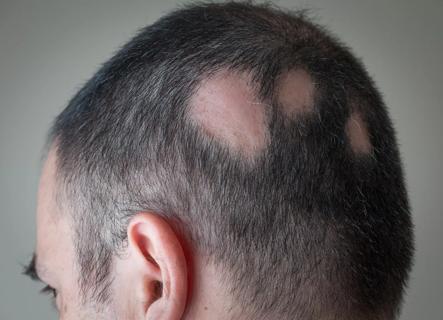The endocrine gland in charge of hormone production may be causing your hair to shed or stop growing

While taking a shower, you look down and notice more clumps of hair than usual circling the drain. In fact, you swear you might be losing hair from your armpits as well. You’ve Googled endlessly about the possible causes, but none of them seem to make sense as to why you might be losing hair.
Advertisement
Cleveland Clinic is a non-profit academic medical center. Advertising on our site helps support our mission. We do not endorse non-Cleveland Clinic products or services. Policy
In truth, rapid hair loss and thinning can happen for a number of reasons, including medications, medical conditions or simply the passing of time. But another possible cause could be your thyroid. Whether you know you have a thyroid condition or not, it may be worth looking into the connection between your hair’s health and your thyroid.
Endocrinologist Mary Vouyiouklis Kellis, MD, dives into how to know if your hair loss is linked to your thyroid — and what you can do about it.
Video content: This video is available to watch online.
View video online (https://cdnapisec.kaltura.com/p/2207941/sp/220794100/playManifest/entryId/1_266kwh74/flavorId/1_5f3sgelj/format/url/protocol/https/a.mp4)
Could your thinning hair be related to a thyroid issue? Discover how high or low hormone levels can affect hair growth.
In short — yes, they can. In fact, thyroid dysfunction can cause you to not only shed hair, but also to stop growing hair altogether. Fortunately, this usually isn’t permanent. But it can be a common symptom of your thyroid’s hormone production not working correctly.
Unlike other types of baldness, thyroid-related hair loss affects not just your scalp, but also your eyebrows, pubic hair and hair on other parts of your body. It can also be caused by certain autoimmune diseases that often go hand in hand with thyroid conditions (more on that in a moment).
“The hair loss is typically reversed after your thyroid hormone levels are normalized,” explains Dr. Vouyiouklis Kellis. “But this may take some time.”
Advertisement
If you’re not familiar with what (or where) your thyroid is — or how it relates to your hair — let’s review a few basics first.
Your thyroid is an endocrine gland located in the front of your neck and serves an important role in your body. It’s in charge of producing and releasing the endocrine hormone into your bloodstream.
Thyroid diseases occur when this hormone production is disrupted. And this can cause your hair to stop growing or even fall out.
This hair loss can happen due to your thyroid making either too many hormones (hyperthyroidism, or an overactive thyroid) or not making enough (hypothyroidism, or an underactive thyroid).
Both underactive and overactive thyroid conditions can cause hair to stop growing, as well as hair loss. In particular, autoimmune thyroid conditions can cause thyroid-related hair loss. Some of these conditions include:
In some cases, you may also be more likely to develop alopecia areata due to a thyroid autoimmune condition. This condition can cause patchy hair loss on the scalp or other areas of your body.
Of course, every day, we lose up to 100 strands of hair from our heads — usually when showering or brushing our hair. But hair loss caused by thyroid conditions has more specific symptoms, including:
Depending on your symptoms and the exact thyroid condition you’re experiencing, your treatment options may vary. It’s important to see a healthcare provider to discuss in detail your symptoms so they can develop the best treatment plan.
If your healthcare provider links thyroid issues with your hair loss, they’ll likely prescribe some treatments to help minimize or reverse hair loss. Your healthcare provider may recommend going on certain medications that can help balance your thyroid’s hormone production, including:
Advertisement
With any kind of extreme hair loss, there are things you can work into your everyday hair routine that can help. The best tactic is to be gentle with your hair. If you’re dealing with hair loss for any reason, it’s important to be aware of the sensitivity of your hair follicles.
Try to avoid:
The vitamin biotin has been recommended by healthcare professionals to boost your keratin (the protein that helps with the formation of hair, skin and nails). While more research is needed on the effects of biotin on hair growth, some studies have suggested a link between the supplement and improved hair thickness.
But you should always talk to your healthcare provider before starting any new supplements — they’ll know what is the right amount for you to take for your hair loss. You can also try working in more biotin-rich foods like almonds, broccoli and eggs as a fail-safe way to introduce more biotin into your system.
Advertisement
Dr. Vouyiouklis Kellis also stresses the importance of remembering how biotin can affect lab results. "Remember to not take biotin for at least 72 hours before labs, as it can potentially cause false lab results," she explains.
It’s important to note that your hair loss may be caused by something other than your thyroid. Other possible causes for hair loss include:
Losing your hair can be distressing, there’s no doubt about that. But knowing the cause can help you learn how best to treat and manage this symptom. If a thyroid issue is behind your hair loss, there are steps you can take. If you’re noticing that you’re starting to shed more hair than usual, be sure to speak with a provider.
Advertisement

Sign up for our Health Essentials emails for expert guidance on nutrition, fitness, sleep, skin care and more.
Learn more about our editorial process.
Advertisement

Take steps to reduce stress by practicing meditation, finding time to relax and maintaining a healthy lifestyle

You may see pitting, brittleness or ridges in your fingernails and toenails

Your immune system may attack hair follicles anywhere on your body

It’s normal to lose around 50 to 150 strands per day to routine hair shedding

Studies are mixed, but frequently wearing very tight, warm hats could stress your follicles and lead to hair loss

Things like stress, heated styling and other health conditions may cause you to lose more hair than normal

Creatine does cause some side effects, but hair loss probably isn’t one of them

A gentle hair care routine, stress reduction and sun protection can help reduce flares and maintain your locks

Even small moments of time outdoors can help reduce stress, boost mood and restore a sense of calm

A correct prescription helps your eyes see clearly — but as natural changes occur, you may need stronger or different eyeglasses

Both are medical emergencies, but they are very distinct events with different causes